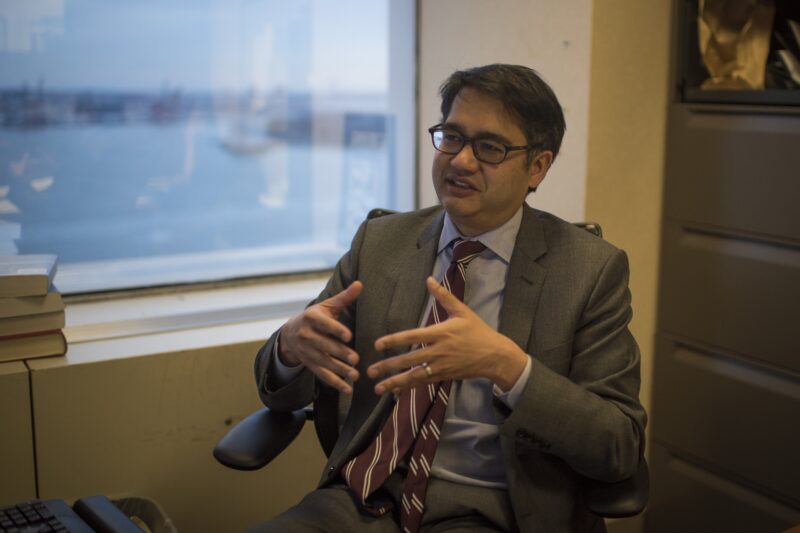His Name Is Omar Jadwat, and He’s the ACLU Lawyer Arguing Against the Muslim Ban. Here’s What He Has to Say About It.


On January 27, when President Trump issued an executive order banning people from seven predominantly Muslim countries from entering the U.S., Omar Jadwat, director of the ACLU’s Immigrants’ Rights Project, did not expect that the administration would be so eager to implement it that officials would detain and attempt to deport people who had been in the air, heading to the United States, when it was signed. But that’s what happened. Jadwat and his team worked through the night, together with lawyers and law students at the National Immigration Law Center and the International Refugee Assistance Project and the Workers and Immigrants Rights Advocacy Clinic at Yale Law School, to file a lawsuit on behalf of two detained Iraqi men and others in the same situation.
With at least a thousand people assembled in front of the federal courthouse in Brooklyn to protest the travel ban, the ACLU and its partners secured a court order blocking the deportation of all people stranded in U.S. airports, nationwide.
A federal court in Washington soon issued an order blocking the January ban order even more broadly. After losing a round in the court of appeals, the president issued a revised executive order — sometimes referred to as Muslim Ban 2.0 — that has itself been swiftly blocked by federal courts in Hawai‘i and Maryland.
On Monday, Jadwat will be in court in Richmond, VA, arguing against the government’s appeal of the Maryland district court’s decision in International Refugee Assistance Project v. Trump. This will be the first argument in a federal court of appeals about Muslim Ban 2.0.
The argument takes place 2:30 p.m., Monday, May 8, at 1100 East Main Street, Richmond, Virginia, and will be live streamed.
Below is a slightly edited version of our conversation.
Q: Why is your argument in the Fourth Circuit on Monday, May 8, so important?
It’s the first appellate argument on whether the current version of the Muslim ban is lawful and constitutional. It could determine whether the Muslim ban — which is an unprecedented violation of the fundamental Constitutional principle that the government may not disfavor any particular religion — will be able to go forward at all.
It’s a critical moment for the courts. The government’s asking that the courts blind themselves to the facts in this case and allow the ban to go forward even though the President has made absolutely clear that he wanted to target Muslims. It would be disastrous to go down that road.
Q: How do you feel personally invested in this case? Does it mean something to you personally?
It means a lot to me personally. The Constitution’s commitments to equality, including religious equality, protect all of us in our daily lives.
The possibility that the president might be able to go forward with something like this would affect my family, my community — lots of people I care about — in a very direct way.
I’ve personally seen how, for my Muslim family members overseas, the ability to come to the United States, be treated fairly and decently in the process, and experience our pluralistic, multicultural society, does a lot to counteract anti-American propaganda. The idea we would take away this powerful and important example of religious tolerance and replace it with an unjustifiable form of discrimination is something that honestly worries me.
Q: How does it feel to be at the center of something that so many people are interested in? How do you handle the pressure?
I’m really glad so many people are interested in this, and, more importantly, they’re interested in it for really good and important reasons. My experience has been that once you’re actually up there and doing your argument you focus entirely on what’s going on in the room, and no amount of external interest makes a difference on the day because you’re so focused on the task at hand.
There’s no question the stakes are high in this case and that causes some pressure. I’ve done high stakes cases before, and so have a lot of folks here at the ACLU. That’s what we do.
All that you can really do is work hard, prepare, and go in and do your best.
Q: This isn’t the first time your team has argued this case. The day after the president signed the executive order, you were in the Brooklyn federal courthouse and got an emergency stay against the order. How did it feel that day to see two things emerge together — the executive order born of such hate and the spontaneous resistance movement of people ready to fight hate?
It was so energizing to see that crowd there as we walked out of the courthouse. I think that moment really crystallized for me that there was going to be a path forward. There was going to be a way for people to stand up against hate and that way was not just going to be what we did in the courts. It was also ordinary people standing up and resisting.
Our court battles are part of that equation — part of it — but far from the only thing to resist that agenda. That was made very clear.

